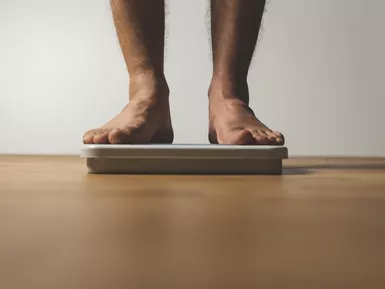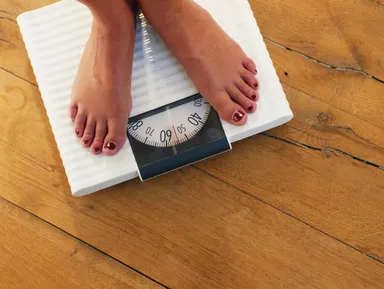The Truth About Rapid Weight Loss: What's Really Happening to Your Body

The Truth About Rapid Weight Loss: What's Really Happening to Your Body
Losing weight is a common goal for many people, but the desire to see quick results can sometimes lead to unhealthy and unsustainable methods. While rapid weight loss may seem appealing, it's important to understand the potential consequences it can have on your body. In this blog post, we'll explore what really happens when you lose weight too quickly and why a balanced approach is key for long-term success.
The Basics of Weight Loss
Before we dive into the effects of rapid weight loss, let's first review the basics of how our bodies lose weight. When we consume fewer calories than we burn, our bodies begin to use stored fat for energy, resulting in weight loss. This process is known as a calorie deficit. While creating a calorie deficit is essential for weight loss, it's important to do so in a healthy and sustainable way.
The Dangers of Rapid Weight Loss
Losing weight too quickly can have a number of negative effects on your body, including:
- Muscle Loss: When you lose weight too quickly, your body may begin to break down muscle tissue for energy. This can lead to a decrease in muscle mass, which can slow down your metabolism and make it more difficult to maintain your weight loss in the long term.
- Nutrient Deficiencies: Rapid weight loss can also lead to nutrient deficiencies, as you may not be consuming enough of the essential vitamins and minerals your body needs to function properly. This can have a number of negative health effects, including fatigue, weakness, and hair loss.
- Gallstones: Losing weight too quickly can increase your risk of developing gallstones, which are hard deposits that form in the gallbladder. Gallstones can cause pain, nausea, and vomiting, and may require surgical removal.
- Dehydration: When you lose weight quickly, you may also lose a significant amount of water weight. This can lead to dehydration, which can cause a number of symptoms, including dizziness, fatigue, and dry mouth.
- Yo-Yo Dieting: Rapid weight loss is often followed by rapid weight gain, as your body may go into "starvation mode" and slow down your metabolism to conserve energy. This can make it more difficult to lose weight in the future and can lead to a cycle of yo-yo dieting.
The Importance of a Balanced Approach
While it's important to create a calorie deficit to lose weight, it's equally important to do so in a healthy and sustainable way. A balanced approach to weight loss includes:
- Eating a Balanced Diet: Focus on consuming a variety of nutrient-dense foods, including fruits, vegetables, whole grains, lean proteins, and healthy fats. Avoid processed foods, sugary drinks, and excessive amounts of saturated and trans fats.
- Getting Enough Exercise: Aim for at least 150 minutes of moderate-intensity aerobic exercise per week, such as brisk walking, cycling, or swimming. Incorporate strength training exercises, such as weightlifting or bodyweight exercises, at least twice per week to build muscle and increase your metabolism.
- Staying Hydrated: Drink plenty of water throughout the day to stay hydrated and help flush out toxins from your body.
- Getting Enough Sleep: Aim for 7-8 hours of sleep per night to support your overall health and well-being.
- Managing Stress: Chronic stress can contribute to weight gain, so it's important to find healthy ways to manage stress, such as meditation, yoga, or deep breathing exercises.
The Role of Metabolism in Weight Loss
Your metabolism plays a crucial role in weight loss. It's the process by which your body converts the food you eat into energy. When you create a calorie deficit, your body begins to use stored fat for energy, which can lead to weight loss. However, if you lose weight too quickly, your body may slow down your metabolism to conserve energy, making it more difficult to lose weight in the long term.
The Importance of Patience and Consistency
Losing weight takes time and effort, and there's no quick fix or magic pill. It's important to be patient and consistent with your diet and exercise routine, and to focus on making sustainable lifestyle changes that you can maintain over the long term. Remember, slow and steady wins the race!
Conclusion
In conclusion, while rapid weight loss may seem appealing, it's important to understand the potential consequences it can have on your body. A balanced approach to weight loss, including a healthy diet, regular exercise, and lifestyle changes, is key for long-term success. Remember to be patient, consistent, and kind to yourself, and to focus on making sustainable lifestyle changes that you can maintain over the long term. With the right mindset and approach, you can achieve your weight loss goals and improve your overall health and well-being.
Take Action
If you're looking to lose weight in a healthy and sustainable way, here are some tips to get you started:
- Consult with a Healthcare Professional: Before starting any weight loss program, it's important to consult with a healthcare professional, such as a doctor or registered dietitian, to ensure that it's safe and appropriate for you.
- Set Realistic Goals: Set realistic and achievable weight loss goals for yourself, and focus on making small, sustainable changes to your diet and exercise routine over time.
- Track Your Progress: Keep a food diary and track your exercise progress to help you stay accountable and motivated.
- Find a Support System: Surround yourself with supportive friends, family members, or a weight loss group to help you stay on track and motivated.
- Be Patient and Kind to Yourself: Remember, losing weight takes time and effort, and there will be ups and downs along the way. Be patient with yourself, and don't get discouraged if you don't see results immediately. Celebrate your successes along the way, and focus on making sustainable lifestyle changes that you can maintain over the long term.

The Atkins Diet: What to Eat and Avoid for Weight Loss Success

Debunking 5 Sugar Myths for Successful Weight Loss

The Impact of Weight Loss Pills During Pregnancy & Scientific Weight Management Strategies Introduction

How Fast Can a 250-Pound Person Healthily Lose 10 Pounds? A Compassionate and Realistic Guide

How Long to Lose 50 Pounds on a 1,200-Calorie Diet? Science-Based Timelines

Navigating a Diverticulitis Diet: 7 Key Foods to Limit During Flare-Ups (and What to Eat for Gut Comfort)

1,200-Calorie Diet for Men: Safe Strategies for Effective Weight Loss

400 Calories Burned: 7 Enjoyable Activities for Safe, Effective, and Sustainable Weight Loss

Low-Carb Tomato Soup: Keep the Comfort, Cut the Carbs

